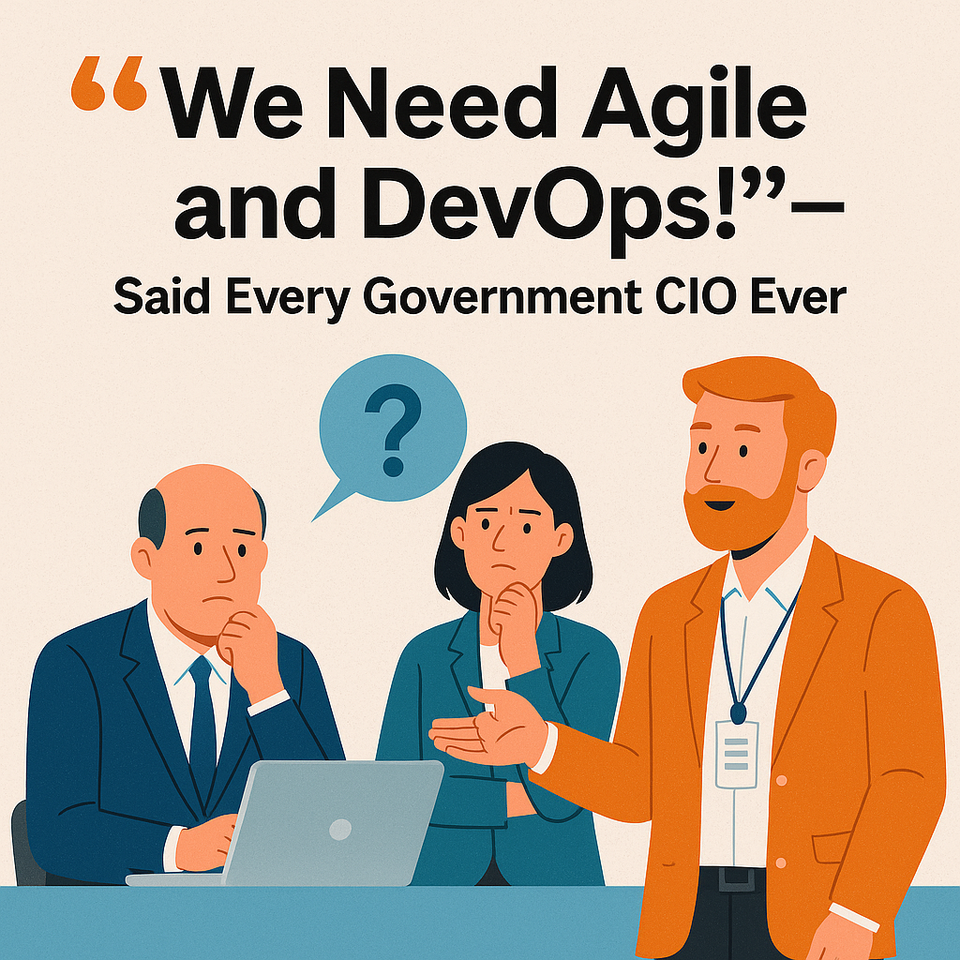“We Need Agile and DevOps!” — Said Every Government CIO Ever

Why Real Transformation Begins With an Outsider
“Your CIO just read about this Agile/DevOps thing and wants it implemented. Even though they’re not entirely sure what it means. Now what?”
If you work in a public-sector IT agency, this might hit close to home.
It usually starts with a buzzword dropped in a mayor’s meeting, a keynote at a tech conference, or an audit recommendation. Suddenly, Agile and DevOps are on everyone’s lips. “We need to be more agile.” “Let’s do DevOps.” “Other counties are doing it.” “Can we have that by next quarter?”
But here’s the truth: Agile and DevOps are not toolsets or quick wins — they’re cultural shifts, deep organizational changes that challenge existing silos, roles, processes, and even the way leadership thinks about delivering value.
That kind of change? It doesn’t happen with a PowerPoint. And it definitely doesn’t happen because someone sent a few staffers to a two-day “Agile Bootcamp.”
The Internal Expert Paradox
Now, here’s where things get awkward.
Let’s say your agency already has someone who knows Agile or DevOps — maybe they’ve worked in the private sector, maybe they’ve seen real transformations. Great, right? Not exactly.
In public IT, there's an unfortunate truth: “Nobody is a preacher in their own land.”
That internal expert — the one who’s been advocating for automation, iterative delivery, product thinking — suddenly finds themselves met with glazed eyes, passive nods, or worse, organizational antibodies that treat them as a disruption. The same ideas that would spark enthusiasm if pitched by an outside consultant are dismissed internally as “unrealistic” or “too idealistic.”
Why? Because they’re one of us. Familiarity breeds dismissal. Their warnings and advice come across as complaints or theory, not strategy.
Why You Need an External Specialist
To move forward, the internal advocate needs air cover. Enter the external, neutral, DevOps and Agile transformation specialist.
Not a vendor trying to sell a tool. Not someone with a cookie-cutter playbook. But a practitioner who understands the public sector context and can speak with both technical credibility and organizational empathy.
An external specialist brings:
- Credibility: They’re perceived as objective. Their message lands not as critique, but as insight.
- Political capital: They can say the uncomfortable truths leadership needs to hear, without fear of internal retaliation.
- Momentum: They validate and amplify internal voices, accelerating conversations that would otherwise stall.
- Structure: They provide a real roadmap for cultural transformation — not just Jira boards and CI/CD pipelines.
In fact, the best external consultants don’t replace internal talent — they empower them. They serve as a bridge between leadership’s vision and the boots-on-the-ground reality.
A Word of Caution
Not all consultants are equal. Some will sell you “Agile” as a new process chart or DevOps as a cloud migration strategy. If your transformation doesn’t address how teams are structured, how decisions are made, how value is measured, and how failure is treated — it’s not a transformation. It’s a rebrand.
Final Thoughts
DevOps and Agile are not projects. They are journeys. And like any meaningful journey, the first steps matter.
So when your CIO says, “Let’s do DevOps,” take a breath, and instead of rushing into tools or rituals, ask:
“Who is going to help us challenge our own assumptions?”
Because inside your four walls, you might already have the answers. You just need someone from the outside to help everyone else hear them.



Member discussion